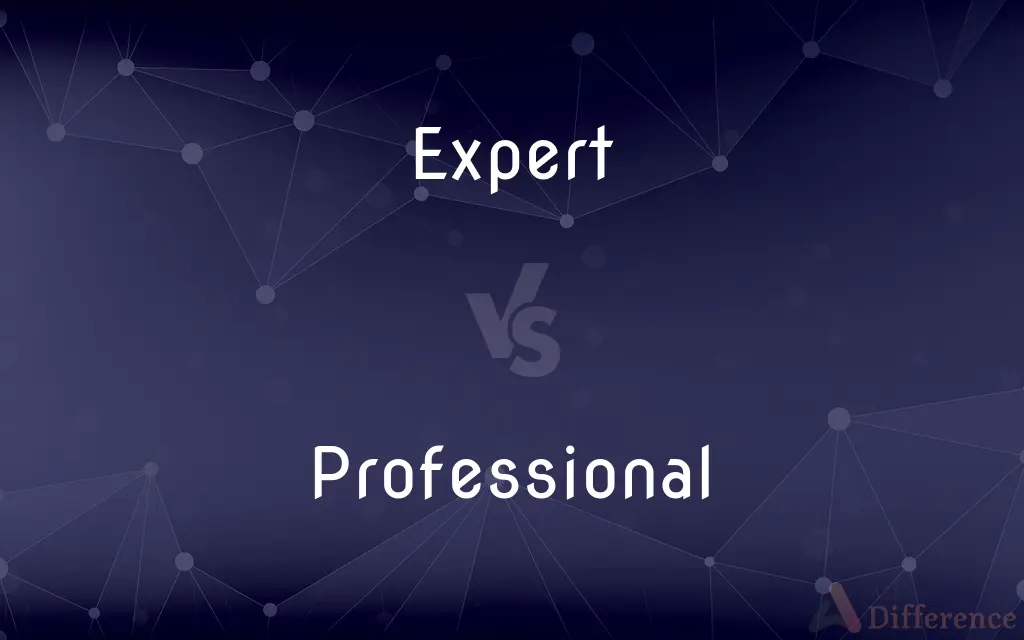Expert vs. Professional — What's the Difference?
Edited by Tayyaba Rehman — By Urooj Arif — Updated on February 28, 2024
An expert is someone with extensive knowledge or skill in a specific field, while a professional is someone who earns their living from a specified activity.

Difference Between Expert and Professional
Table of Contents
ADVERTISEMENT
Key Differences
An expert gains their status through deep knowledge and skill in a particular area, often acquired through extensive study and experience. Professionals, on the other hand, are defined by their commitment to a career in a specific field, adhering to its ethical standards and often holding relevant qualifications.
This specialization of experts allows them to provide insights or perform tasks that others cannot, making them highly valued for their expertise. Their status as professionals comes from their approach to their work, including ongoing learning and adherence to industry standards.
The distinction between an expert and a professional lies in the depth of knowledge versus the application of knowledge in a career context. While all experts in a field may not be professionals, all professionals aim to be experts to excel in their careers.
Experts are often sought after for their advice and problem-solving abilities in their field of specialization. They may contribute to advancements in their field through research, innovation, or teaching. Professionals, while they may also possess a high level of expertise, are characterized by their dedication to maintaining and enhancing their skills in a professional setting. This includes participating in continuous education, certification programs, and professional associations.
Comparison Chart
Definition
An individual with extensive knowledge or skill in a specific area.
An individual engaged in a specific occupation for which they are trained and often certified.
ADVERTISEMENT
Basis of Status
Depth of knowledge and skill.
Engagement in a career and adherence to its standards.
Main Characteristics
Specialization, deep understanding, and problem-solving ability.
Ethical standards, continuous learning, and qualification.
Purpose
To provide expert advice, solve complex problems, and contribute to advancements in their field.
To earn a living from a specified activity while maintaining professional standards.
Example
A cybersecurity expert who develops advanced security protocols.
A professional accountant certified by a recognized accounting body.
Compare with Definitions
Expert
An individual whose expertise allows them to solve complex problems.
The company hired an expert to enhance their data encryption methods.
Professional
An individual who earns their living from a specified professional activity.
As a professional photographer, he covers events around the world.
Expert
A person with extensive knowledge in a specific field.
She is considered an expert in marine biology due to her groundbreaking research on coral reefs.
Professional
Someone who adheres to the ethical standards of their profession.
She is a professional journalist, committed to accuracy and impartiality.
Expert
A specialist in a particular area or subject.
He is an expert in ancient Greek history.
Professional
A person engaged in a profession requiring specialized knowledge and often formal qualifications.
Professional engineers are required to be licensed in many countries.
Expert
Someone recognized for their deep understanding and skill.
An expert chess player can anticipate an opponent's moves several turns in advance.
Professional
An individual distinguished by their professional approach to their work.
As a professional in customer service, she ensures every client feels valued.
Expert
A professional highly regarded for their advanced knowledge.
As an expert in renewable energy, she consults for international environmental organizations.
Professional
A worker who maintains a commitment to continuous learning in their field.
He is a professional educator, always updating his knowledge on teaching methods.
Expert
An expert is somebody who has a broad and deep competence in terms of knowledge, skill and experience through practice and education in a particular field. Informally, an expert is someone widely recognized as a reliable source of technique or skill whose faculty for judging or deciding rightly, justly, or wisely is accorded authority and status by peers or the public in a specific well-distinguished domain.
Professional
A professional is a member of a profession or any person who earns a living from a specified professional activity. The term also describes the standards of education and training that prepare members of the profession with the particular knowledge and skills necessary to perform their specific role within that profession.
Expert
A person with a high degree of skill in or knowledge of a certain subject.
Professional
Of, relating to, engaged in, or suitable for a profession
Lawyers, doctors, and other professional people.
Expert
Having, involving, or demonstrating skill in or knowledge of a certain subject.
Professional
Conforming to the standards of a profession
Professional behavior.
Expert
Extraordinarily capable or knowledgeable.
I am expert at making a simple situation complex.
My cousin is an expert pianist.
Professional
Engaging in a given activity as a source of livelihood or as a career
A professional writer.
Expert
Characteristic of an expert.
This problem requires expert knowledge.
Professional
Performed by persons receiving pay
Professional football.
Expert
A person with extensive knowledge or ability in a given subject.
We called in several experts on the subject, but they couldn't reach an agreement.
Professional
Having or showing great skill; expert
A professional repair job.
Expert
A person with special knowledge or ability who performs skillfully
Professional
A reputation known by name
Professional
A person engaged in one of the learned professions
Professional
Of or relating to a profession;
We need professional advice
Professional training
Professional equipment for his new office
Professional
Engaged in by members of a profession;
Professional occupations include medicine and the law and teaching
Common Curiosities
What is the role of ethics in being a professional?
Ethics play a crucial role in being a professional, guiding behavior, ensuring integrity, and maintaining trust in professional-client relationships.
What makes someone an expert?
An expert is made through deep, specialized knowledge and extensive experience in a specific field, often recognized by peers for their expertise.
Is formal education required to be an expert or a professional?
While formal education often contributes to becoming a professional, experts can also emerge through self-study, research, and practical experience. Professionals typically need formal qualifications.
How do experts contribute to their fields?
Experts contribute to their fields through innovation, research, teaching, and applying their knowledge to solve complex problems.
How does one become recognized as an expert?
Recognition as an expert usually comes from contributions to the field, such as published research, problem-solving achievements, or recognition by peers.
Can a professional be considered an expert?
Yes, a professional can be considered an expert if they possess a high level of knowledge and skill in their field, beyond the basic professional requirements.
Do all professionals need to be certified?
While not all professions require certification, many do to ensure a standard level of competence and to protect the public interest.
What distinguishes a professional's work approach?
A professional's work approach is distinguished by a commitment to quality, ethical standards, continuous learning, and a focus on maintaining a high level of competence in their field.
Can experts work outside of professional settings?
Yes, experts can work outside of professional settings, contributing to academia, research, or as consultants, where their deep knowledge is sought after.
Is it possible for an expert to operate independently of professional organizations?
Yes, it is possible for an expert to operate independently of professional organizations, especially if their expertise is recognized through their contributions, publications, or reputation in their field, rather than formal affiliations.
How do experts maintain their status in a rapidly changing field?
Experts maintain their status by continuously updating their knowledge, engaging in ongoing research, and adapting to new technologies and methodologies in their field.
What is the significance of professional associations?
Professional associations play a significant role in setting standards, providing continuous education, and fostering a sense of community and ethical responsibility among professionals.
Can someone be a professional without being an expert?
Yes, someone can be a professional without being an expert if they meet the qualifications and ethical standards of their profession but have not yet achieved the deep specialized knowledge or high skill level of an expert.
How does one transition from being a professional to an expert in their field?
Transitioning from a professional to an expert involves gaining extensive experience, deepening one’s knowledge through research or continued learning, and contributing significantly to the field, often by solving complex problems or making notable advancements.
Share Your Discovery

Previous Comparison
Wolpertinger vs. Jackalope
Next Comparison
Ocean vs. BeachAuthor Spotlight
Written by
Urooj ArifUrooj is a skilled content writer at Ask Difference, known for her exceptional ability to simplify complex topics into engaging and informative content. With a passion for research and a flair for clear, concise writing, she consistently delivers articles that resonate with our diverse audience.
Edited by
Tayyaba RehmanTayyaba Rehman is a distinguished writer, currently serving as a primary contributor to askdifference.com. As a researcher in semantics and etymology, Tayyaba's passion for the complexity of languages and their distinctions has found a perfect home on the platform. Tayyaba delves into the intricacies of language, distinguishing between commonly confused words and phrases, thereby providing clarity for readers worldwide.
















































